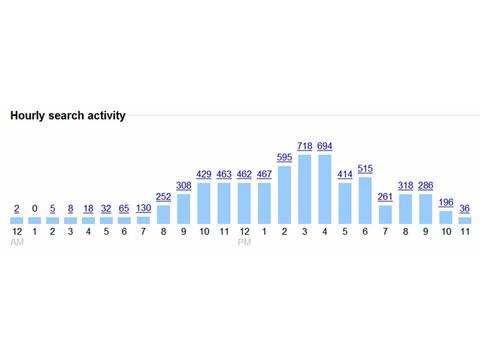Google Personalized Search, 1 Year Later
By Eric Goldman
Exactly 1 year ago, I started using Google Personalized Search. Since then, Google Personalized Search has recorded 6,700 searches of mine–an average of over 18 searches a day, every day (including weekends and vacations), or over 1 Google search every waking hour. My highest daily total was at least 89 searches.
Clearly, from these 6,700 data points, Google should know a lot about me. Yet, I would rank the benefits of Google Personalized Search as low. In some cases, Google prioritizes specific search results that I’ve selected before (and tells me how many times I’ve selected that link), so it can help me find something when I’m revisiting a past search. Otherwise, I can’t say that I’ve noticed any discernible benefits from their personalized search tool.
My suspicion of low efficacy is reinforced by Google’s inability to make good inferences about me. In Google Trends, it shows me what it describes as the “top gaining queries related to your searches”–presumably, these are the search terms it thinks are associated with the search terms I’ve used. The top 10 today:
1. prime outlets
2. ucla taser
3. great mall
4. rhodes scholars
5. tofurky
6. tofurkey
7. marie calendars
8. dundee wisconsin
9. bakers square
10. odot
#5 and 6 surely must relate to my vegetarian-related searches, so this isn’t too bad. #2 may somehow reflect my association with UCLA (good), but UCLA taser? (huh?) #1 and #3 are big outlet malls in the Bay Area, so they are geographically relevant and perhaps seasonally topical due to the holiday shopping season (although I haven’t really been shopping this season). #7 and #9 are a little bizarre for a vegetarian–I’m sure I’ve done restaurant searches, but not for chains like this! I have no idea what triggered #8 or #10. So, on balance, it doesn’t appear like Google is making very smart inferences about me based on the 6,700 searches I’ve provided it. For more on this point, see Greg Linden’s similar comments on Google’s recommendation engine explaining that Google is relying too heavily on geolocation instead of other personalization attributes.
One more interesting piece of data: Google Trends captures the times of my search, which visually illustrates my work habits. Unfortunately, the histogram is distorted by my move from Milwaukee to California mid-year; my Milwaukee activity was 2 hours ahead of this data.
As you can see from this diagram, I generally get into the office between 9-10 am and then work at a constant rate for a few hours. Then, in the late afternoon, I really hit my stride, spiking at 3 pm–which was really 5 pm when I was in Milwaukee. In other words, my real work day begins about 5 pm. Then, there’s a drop-off around 7 pm (5 pm on this chart when I was in Milwaukee), which is when I go home, and then a mini-resurgence between 9-11 after the kids are in bed.
At minimum, this data shows why I’ll never be a great 9-5er. The 5-7 period is among my most efficient work period. When I first became a professor, I tried to come home at 5 pm regularly for a couple of weeks and I felt like I never got anything done. This chart partially explains why.
Despite this fun with graphics, I’m disappointed with Google Personalized Search. I will keep using it because it provides me limited benefits at no additional effort, but it’s not really doing anything to increase my loyalty to Google.
One last point: I know some of you would interpret my experience as a good reason NOT to use personalized search because of the privacy risks associated with Google’s aggregation of search results. I do worry about that, a tiny bit, in that I’m sure people would draw bizarre and potentially adverse inferences if they were to parse through my 6,700 searches. But I’ve made the deliberate choice that I’m not too worried about that risk personally–although I’m not going to publicize my search terms, I’m comfortable enough with their limited privacy protection in Google’s hands.

